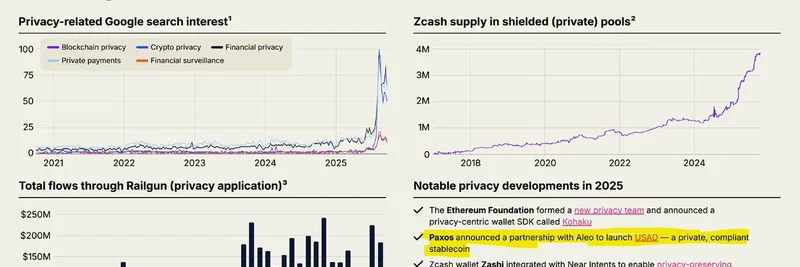<Image src="https://pbs.twimg.com/media/G4DTpO9bsAIpbqe.jpg" alt="a16z Infrastructure Report: The Urgent Need for Privacy in Crypto as It Goes Mainstream" width={800
- It mentions total flows through Railgun surpassing $200M and Zcash's private pool reaching over 4M coins.
} height={450} />
Hey folks, if you've been scrolling through crypto Twitter lately, you might've caught this eye-opening post from PixOnChain. Diving deep into a16z's State of Crypto 2025 report, Pix highlights how privacy isn't just a buzzword anymore—it's exploding into what could be the next massive narrative in blockchain. With Google searches for "crypto privacy" spiking 10x since January, and tools like Zcash and Railgun seeing real traction, we're on the cusp of a privacy revolution. And get this: projects like Aleo are leading the charge with private stablecoins that could redefine how we handle money without Big Brother watching.
Let's break it down like we're chatting over coffee. Why now? Why does this matter for everyday users dipping their toes into crypto? And how does it tie into that future where privacy tech separates the savvy from the sorry?
The Privacy Wake-Up Call: Searches Are Through the Roof
Picture this: You're googling "how to keep my Bitcoin transactions private" because, yeah, that public ledger thing suddenly feels a bit too exposed. You're not alone. The report's first graph shows Google Trends data for terms like "blockchain privacy," "crypto privacy," "financial privacy," "private payments," and "financial surveillance." From 2021 to mid-2025, interest has been climbing steadily, but 2024-2025? It's a hockey stick. "Crypto privacy" and "financial privacy" searches are up over 10 times since the start of the year.
This isn't abstract—it's a signal that as crypto hits mainstream apps and wallets, people are waking up to the risks. Every transaction on chains like Ethereum is forever etched in stone for anyone to see. Tools like Etherscan make it easy to track wallets, link them to identities, and even predict behaviors. In a world of rising surveillance (think CBDCs and digital IDs), who wants their coffee run tokenized and tracked?
Zcash's Shielded Pools: Privacy in Action
Enter Zcash ($ZEC), the OG of privacy coins. Founded on zero-knowledge proofs (zk-proofs, basically math magic that lets you prove something without revealing the details), Zcash lets users opt into "shielded" transactions. The graph here tracks the supply locked in these private pools from 2018 to 2024. It dipped around 2020 but has rocketed back, crossing 4 million coins recently. That's a ton of value hidden from prying eyes—over $200 million at current prices.
Why the resurgence? Adoption. Wallets like Zashi are making it seamless, and integrations (more on that below) are pulling in users from other chains. If you're tired of transparent trades screaming your portfolio to the world, Zcash is your quiet corner.
Railgun: Shielding DeFi Flows Like a Boss
Now, for the DeFi crowd: Railgun is a privacy layer that wraps around EVM chains, letting you swap, lend, and borrow anonymously. The bar chart shows total flows through Railgun jumping from under $50 million in 2023 to over $200 million projected for 2025. That's explosive growth, fueled by users dodging on-chain sleuths.
Simple explainer: Railgun uses zk-SNARKs (succinct non-interactive arguments of knowledge—fancy way of saying efficient privacy proofs) to pool transactions. Your moves blend in, no traces back to you. As DeFi TVL climbs past $100 billion, expect Railgun to keep shielding those gains.
2025's Big Privacy Moves: From Tornado Cash to Aleo's USAD
The report doesn't stop at charts—it spotlights game-changers. Ethereum Foundation launched a dedicated privacy team and unveiled Kohaku, a zk-centric wallet for seamless private txns. Developer buzz around Noir, a zk programming language, is spiking too—think easier building of privacy apps without PhD-level math.
But the crown jewel? Paxos partnering with Aleo to drop USAD, a fully private, compliant stablecoin. (Yeah, that's USD-pegged, privacy edition.) Aleo, a layer-1 built for zero-knowledge everything, is crafting "rails for financial autonomy." While governments push traceable programmable money, Aleo's letting you transact like cash—in code. Pix nails it: This is modern finance, untethered.
Rounding out the wins: Zashi integrated with Near Intents for privacy-preserving cross-chain swaps. And in a plot twist, OFAC lifted sanctions on Tornado Cash in 2025—the DeFi mixer blacklisted back in '22 for laundering fears. Vindication? Or just the start of regulated privacy?
Why This Matters for You (and the Meme Degens)
Look, at Meme Insider, we're all about those viral tokens that moon on hype. But even meme plays need privacy—imagine rug pulls traced back to your main wallet, or airdrops doxxing your stack. As crypto blends with daily life (payments, NFTs, DAOs), ignoring privacy is like posting your seed phrase on CT.
Pix wraps it poetically: Two camps in the future—privacy adopters and regretters. With a16z calling this a "trillion-dollar narrative," now's the time to stack those zk tools. Dive into Aleo here, fire up Railgun, or shield some ZEC. Your future self (and portfolio) will thank you.
What do you think—ready to go private, or still riding transparent rails? Drop your takes below. Stay insider-y, friends. 🚀


